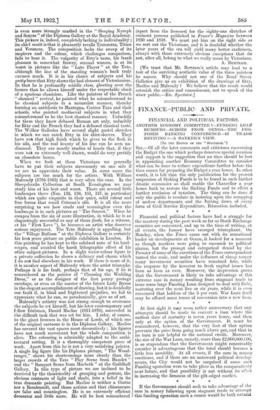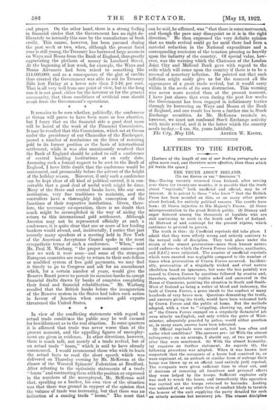FlNANCE—PUBLIC' AND PRIVATE.
FINANCIAL AND POLITICAL FACTORS.
ANOTHER ECONOMY COMMITTEE t—FUNDING LOAN RUMOURS—ECHOES FROM GENOA—THE PRO- POSED BANKING CONFERENCE—IS TRADE REVIVING ?—A BANKER'S VIEW.
(To THE BOMA OP THE "SPEcTrrou."] SIR,—Of all the later comments and criticisms concerning the Budget the one which perhaps deserves special mention and support is the suggestion that no time should be lost in appointing another Economy Committee to consider what can be done to reduce expenditure further before the time comes for preparing the Budget a year hence. In other words, it is felt that the only justification for the present suspension of Sinking Funds is to be found in such further drastic economies as shall enable the Chancellor a year hence both to restore the Sinking Funds and to effect a further remission of taxation. The thing can be done if only the public is resolute in insisting upon the scrapping of useless departments and the putting down of every form of Civil Service Expenditure, Education included.
* * Financial and political factors have had a struggle for the mastery during the past week so far as Stock Exchange securities are concerned, and up to the time of writing, at all events, the former have emerged triumphant. On Monday, when the Times came out with its sensational leader on developments at Genoa, it looked for a moment as though markets were going to succumb to political alarms, but the prompt and categorical denial by the Premier of some of the assertions of the Times correspondent turned the scale, and under the influence of cheap money many investment securities have remained firm, while the response by the investor to fresh capital issues has been as keen as ever. Moreover, the impression grows that the Government is likely to take advantage of this extreme ease in money resulting from stagnant trade to issue some large Funding Loan designed to deal with Debt, maturing over the next five or six years, while it is even rumoured that holders of the 5 per cent. War Loan itself may be offered some terms of conversion into a new loan. * * * At first sight it may seem, rather unnecessary that any attempts should be made to convert a loan where the earliest date of maturity is seven years hence, and then only at the option of the Government. It must be remembered, however, that the very fact of that option prevents the price from going much above par, and that in its turn is not helpful to the national credit. Moreover, the size of the War Loan, namely, more than 0,000,000,000, is so stupendous that the Government might conceivably consider it advantageous that the total should become a little less unwieldy. At all events, if the ease in money continues, and if there are no untoward political develop- ments, the City would not be surprised if some such Funding operation were to take place in the comparatively near future, and that possibility is not without its effect in increasing the firmness of the gilt-edged market.
• * * If the Government should seek to take advantage of the ease in money following upon stagnant trade to attempt this funding operation such a course would be both natural and proper. On the other hand, there is a strong feeling in financial circles that the Government has no right de- liberately to intensify this ease by the manufacture of fresh credit. This course, however, has been pursued during the past week or two, when, although the present fiscal year is still young, the Treasury has borrowed large amounts on Ways and Means from the Bank of England, thus greatly aggravating the plethora of money in Lombard Street. At the beginning of last week, for example, the Ways and Means Advances had been raised to something like £14,000,000, and as a consequence of the glut of credits thus created the Government was able to sell its Treasury Bills last Friday at a lower rate than 2 3-16 per cent. That is all very well from one point of view, but in the long run it is not good, either for the investor or for the general community, that these conditions of artificial ease should result from the Government's operations.
* * It remains to be seen whether, politically, the conference at Genoa will prove to have been more or less abortive, but I fancy that on the financial side a good deal more will be heard of the work of the Financial Commission. It may be recalled that this Commission, which sat at Genoa under the presidency of our Chancellor of the Exchequer, passed a number of resolutions on the lines of restoring gold to its former position as the basis of international settlement, while it was also unanimously resolved that the Bank of England should be asked to call a conference of central banking institutions at an early date. Assuming such a formal request to be sent to the Bank of England, I have little doubt that the conference would be summoned, and presumably before the advent of the height of the holiday season. Moreover, if only such a conference can be kept clear of all kind of political control, it is con- ceivable that a good deal of useful work might be done. Many of the State and central banks have, like our own institution, very fine traditions to maintain, and the controllers have a thoroughly high conception of the functions of their respective institutions. Given, there- fore, the necessary co-operation, there is no doubt that much might be accomplished in the way of aiding the return to this international gold settlement. Although America may not be represented officially at such a conference, it is quite clear that one or more of her leading bankers would attend, and, incidentally, I notice that just recently many speakers at a meeting held in New York of the American Acceptance Council spoke in the most sympathetic terms of such a conference. " When," said Mr. Paul M. Warburg, " the proper moment comes—and how we wish it were soon—and some of the strongest European countries are ready to return to their ante-bellum or modified system of free gold payments, we may find it timely to go to Congress and ask for an amendment which, for a certain number of years, would give the Reserve Board power to permit its member-banks to accept financial drafts drawn by banks of countries completing their fiscal and financial rehabilitation." Mr. Warburg recalled that the British banks before the inauguration of the Reserve system in the States had taken such action in favour of America when excessive gold exports threatened the United States.
In view of the conflicting statements with regard to actual trade conditions the public may be well excused for bewilderment as to the real situation. In some quarters it is affirmed that trade was never worse than at the present moment, and the appalling figures of unemploy- ment are given in evidence. In other directions, however, there is much talk, not merely of a trade revival, but of an actual trade " boom," which is said to have already -commenced. I would recommend those who wish to learn the actual facts to read the short speech which was delivered on Thursday evening by Mr. McKenna at the dinner of the Worsted Spinners' Federation at Bradford. After referring to the optimistic statements of a trade " boom " and contrasting them with the position as expressed in the numbers of the unemployed, Mr. McKenna said that, speaking as a banker, his own view of the situation i was that there was ground in support of the opinion that the volume of trade was increasing, but that there was no indication of a coming trade " boom." The most that can be said, he affirmed, was "that there is seine movement, and though the pace may disappoint us it is in the right direction." He then expressed the very definite opinion that no trade revival could go far until there had been a material reduction in the National expenditure and a corresponding remission of the taxation pressing so heavily upon the industry of the country. Of special value, how- ever, was the warning which the Chairman of the London Joint City and Midland Bank gave with regard to the evils which will come upon the country if there is to be a renewal of monetary inflation. He pointed out that such inflation might easily give us for the moment all the appearance of a great trade revival, but it would carry within it the seeds of its own destruction. This warning was never more needed than at the present moment. I have just shown that even during the past few weeks the Government has been engaged in inflationary tactics through its borrowing on Ways and Means at the Bank of England, and one result has been a further rise in Stock Exchange securities. As Mr. McKenna reminds us, however, we must not confound Stock Exchange activity with trade revival, and it is the latter which the country needs to-day.—I am, Sir, yours faithfully,



































 Previous page
Previous page